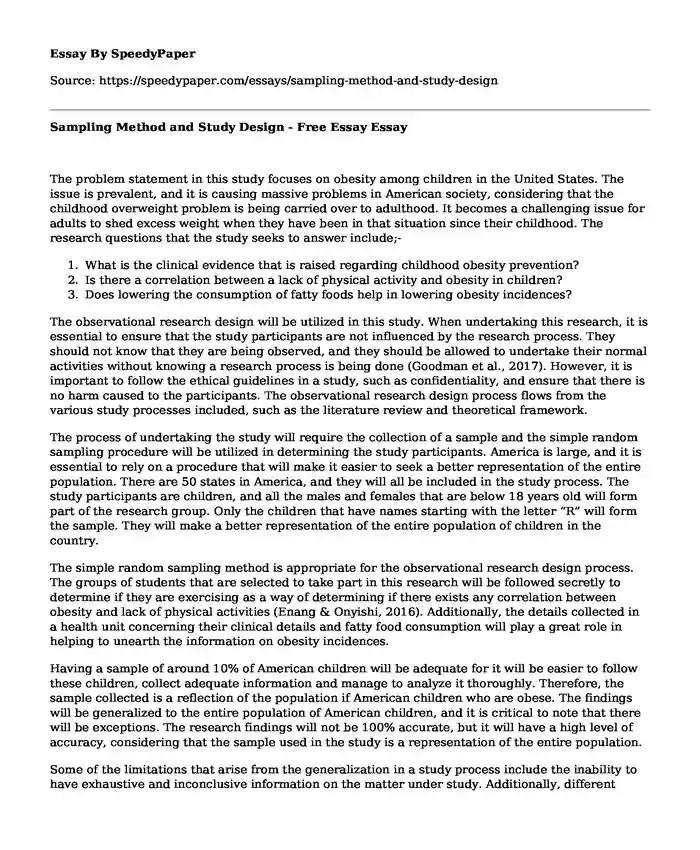
| Essay type: | Analytical essays |
| Categories: | Research Healthcare Child development Nutrition |
| Pages: | 3 |
| Wordcount: | 701 words |
The problem statement in this study focuses on obesity among children in the United States. The issue is prevalent, and it is causing massive problems in American society, considering that the childhood overweight problem is being carried over to adulthood. It becomes a challenging issue for adults to shed excess weight when they have been in that situation since their childhood. The research questions that the study seeks to answer include;-
- What is the clinical evidence that is raised regarding childhood obesity prevention?
- Is there a correlation between a lack of physical activity and obesity in children?
- Does lowering the consumption of fatty foods help in lowering obesity incidences?
The observational research design will be utilized in this study. When undertaking this research, it is essential to ensure that the study participants are not influenced by the research process. They should not know that they are being observed, and they should be allowed to undertake their normal activities without knowing a research process is being done (Goodman et al., 2017). However, it is important to follow the ethical guidelines in a study, such as confidentiality, and ensure that there is no harm caused to the participants. The observational research design process flows from the various study processes included, such as the literature review and theoretical framework.
The process of undertaking the study will require the collection of a sample and the simple random sampling procedure will be utilized in determining the study participants. America is large, and it is essential to rely on a procedure that will make it easier to seek a better representation of the entire population. There are 50 states in America, and they will all be included in the study process. The study participants are children, and all the males and females that are below 18 years old will form part of the research group. Only the children that have names starting with the letter “R” will form the sample. They will make a better representation of the entire population of children in the country.
The simple random sampling method is appropriate for the observational research design process. The groups of students that are selected to take part in this research will be followed secretly to determine if they are exercising as a way of determining if there exists any correlation between obesity and lack of physical activities (Enang & Onyishi, 2016). Additionally, the details collected in a health unit concerning their clinical details and fatty food consumption will play a great role in helping to unearth the information on obesity incidences.
Having a sample of around 10% of American children will be adequate for it will be easier to follow these children, collect adequate information and manage to analyze it thoroughly. Therefore, the sample collected is a reflection of the population if American children who are obese. The findings will be generalized to the entire population of American children, and it is critical to note that there will be exceptions. The research findings will not be 100% accurate, but it will have a high level of accuracy, considering that the sample used in the study is a representation of the entire population.
Some of the limitations that arise from the generalization in a study process include the inability to have exhaustive and inconclusive information on the matter under study. Additionally, different states may be engaging in different activities that are triggering a rise in the obesity level among children (Magliocca et al., 2018). Therefore, when the study process is generalized and confusion raised, the resolutions raised may not be the true representation of the entire population, meaning that it is not possible to test for precision.
References
Enang, E. I., & Onyishi, I. L. (2016). Population Total and Variance Estimation in Multi-Stage Cluster Sampling: A Simple Random Sampling Approach. International Journal of Applied Science and Mathematical Theory, 2(2), 18-30.
Goodman, S. N., Schneeweiss, S., & Baiocchi, M. (2017). Using design thinking to differentiate useful from misleading evidence in observational research. Jama, 317(7), 705-707. doi:10.1001/jama.2016.19970
Magliocca, N. R., Ellis, E. C., Allington, G. R., De Bremond, A., Dell’Angelo, J., Mertz, O., ... & Verburg, P. H. (2018). Closing global knowledge gaps: producing generalized knowledge from case studies of social-ecological systems. Global Environmental Change, 50, 1-14.
Cite this page
Sampling Method and Study Design - Free Essay. (2023, Oct 10). Retrieved from https://speedypaper.com/essays/sampling-method-and-study-design
Request Removal
If you are the original author of this essay and no longer wish to have it published on the SpeedyPaper website, please click below to request its removal:
- Essay Example: Inclusivity Dynamics that Work for Unskilled Nurses
- Cause and Effect on College Students with Depression. Essay Example.
- Essay Example on the Importance of Family and Education
- Essay Sample on Functions of the Lymphatic System
- Essay Sample on Ethical Constraints That Exist in Research With Human Subjects.
- Cognitivism: Analytical Process, Internal Focus, Memory Development - Essay Sample
- Essay Sample on Hope to High Schoolers During the Pandemic
Popular categories




